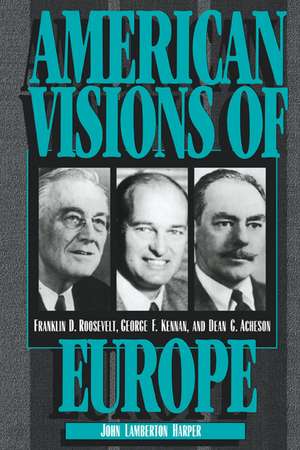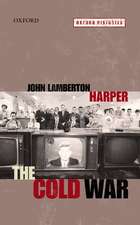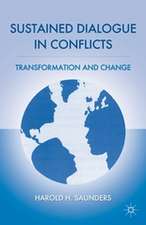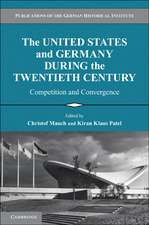American Visions of Europe: Franklin D. Roosevelt, George F. Kennan, and Dean G. Acheson
Autor John Lamberton Harperen Limba Engleză Paperback – 12 iun 1996
Preț: 273.72 lei
Nou
Puncte Express: 411
Preț estimativ în valută:
52.38€ • 56.01$ • 43.67£
52.38€ • 56.01$ • 43.67£
Carte tipărită la comandă
Livrare economică 18 aprilie-02 mai
Preluare comenzi: 021 569.72.76
Specificații
ISBN-13: 9780521566285
ISBN-10: 0521566282
Pagini: 396
Ilustrații: 3 b/w illus.
Dimensiuni: 154 x 233 x 30 mm
Greutate: 0.54 kg
Ediția:Revised
Editura: Cambridge University Press
Colecția Cambridge University Press
Locul publicării:New York, United States
ISBN-10: 0521566282
Pagini: 396
Ilustrații: 3 b/w illus.
Dimensiuni: 154 x 233 x 30 mm
Greutate: 0.54 kg
Ediția:Revised
Editura: Cambridge University Press
Colecția Cambridge University Press
Locul publicării:New York, United States
Cuprins
Acknowledgements; Introduction; Part I: 1. Franklin Roosevelt, Europe, and American diplomatic culture, 1882–1932; 2. The Roosevelt administration and the European question, 1933–1941; 3. The Roosevelt solution, 1941–1945; Part II: 4. George F. Kennan: the sources of estrangement, 1904–1944; 5. Three worlds instead of two: George F. Kennan and Europe, 1944–1950; Part III: 6. Dean Acheson, 1893–1947: a Victorian for all seasons; 7. Acheson and Europe, 1949–51: a statesman's progress; Conclusion; Bibliography; Index.
Recenzii
"Harper's writing is clear, concise and jargon free, and his research is solidly based on both primary and secondary sources. This well-written work should be required reading for anyone interested in the personalities and policies of the early, formative years of the cold war." Library Journal
"Harper creatively melds biography with cultural and diplomatic history in this triptych of portraits of important architects of US policy towards Europe ...An absorbing study of the linkages between personal and diplomatic perspectives--illuminating as historical background in this period of European integration and diminished American power." Kirkus Reviews
"John Harper has written a finely crafted meditation on Europe's role in the imagination of twentieth-century American statesmen. At a time when we and the Europeans again face uncharted dilemmas, Harper's account challenges, instructs and sometimes disquiets." Charles S. Maier, Harvard University
"John Harper has done something that no one else has done to date. Not only that, he has done it exceedingly well. He has enabled us to see our European interest in a perspective we did not have before. A book of great relevance for the present juncture." Robert Tucker, Johns Hopkins University
"Through the intertwined lives of three American statesmen, John Harper has illuminated America's ambivalent attachment to Europe with rare eloquence and insight." Ronald Steel, University of Southern California
"...urbane, thoughtful ruminations on America's vexed relationship with the continent that is its cultural and institutional home." The Washington Times
"In a first-rate treatment of the ideas that shaped American diplomatic culture at midcentury, Harper shows how cultural milieu, education, and early career contacts with Europeans shaped the European vision of each protagonist and, in turn, influenced American Cold War diplomacy for a generation." Choice
"...wonderfully erudite work....a brilliant exposition of the basically unchanging problems of U.S. European policy, from Wilson through Truman, by means of the study of the approaches of three very major practitioners...." Dan Simpson, Foreign Service Journal
"Taken together, as an investigation of a theme, the triptych works surprisingly well....Taken singly, as biographies in miniature, they are even more impressive....They are explored throughout with exceptional sympathy and discrimination." Alex Danchev, Times Higher Education Supplement
"Harper creatively melds biography with cultural and diplomatic history in this triptych of portraits of important architects of US policy towards Europe ...An absorbing study of the linkages between personal and diplomatic perspectives--illuminating as historical background in this period of European integration and diminished American power." Kirkus Reviews
"John Harper has written a finely crafted meditation on Europe's role in the imagination of twentieth-century American statesmen. At a time when we and the Europeans again face uncharted dilemmas, Harper's account challenges, instructs and sometimes disquiets." Charles S. Maier, Harvard University
"John Harper has done something that no one else has done to date. Not only that, he has done it exceedingly well. He has enabled us to see our European interest in a perspective we did not have before. A book of great relevance for the present juncture." Robert Tucker, Johns Hopkins University
"Through the intertwined lives of three American statesmen, John Harper has illuminated America's ambivalent attachment to Europe with rare eloquence and insight." Ronald Steel, University of Southern California
"...urbane, thoughtful ruminations on America's vexed relationship with the continent that is its cultural and institutional home." The Washington Times
"In a first-rate treatment of the ideas that shaped American diplomatic culture at midcentury, Harper shows how cultural milieu, education, and early career contacts with Europeans shaped the European vision of each protagonist and, in turn, influenced American Cold War diplomacy for a generation." Choice
"...wonderfully erudite work....a brilliant exposition of the basically unchanging problems of U.S. European policy, from Wilson through Truman, by means of the study of the approaches of three very major practitioners...." Dan Simpson, Foreign Service Journal
"Taken together, as an investigation of a theme, the triptych works surprisingly well....Taken singly, as biographies in miniature, they are even more impressive....They are explored throughout with exceptional sympathy and discrimination." Alex Danchev, Times Higher Education Supplement
Descriere
This book is a biographical study of three American statesmen, concentrating on their distinct approaches to the problem of Europe.











